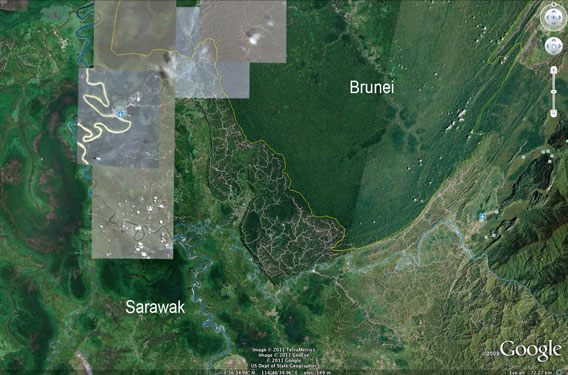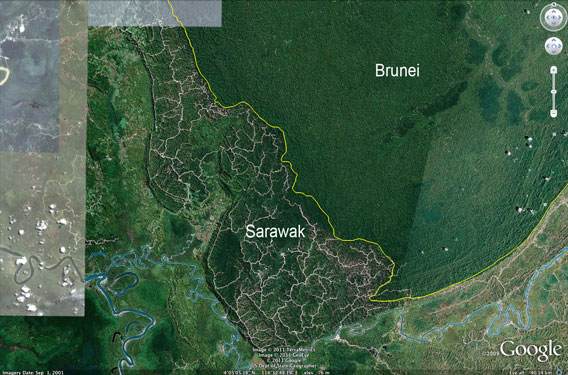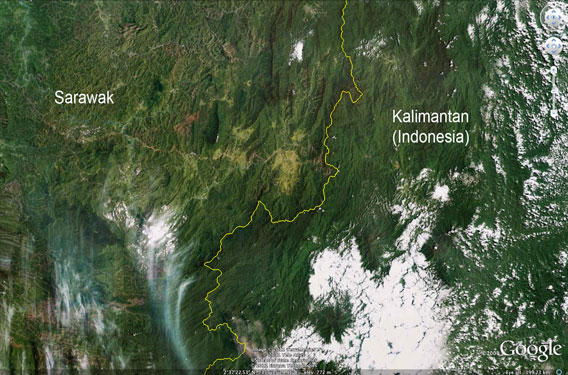Google Earth images from GeoEye, TerraMetrics, Tele Atlas, Europa Technologies, and other providers show logging roads snaking across Sarawak's forest areas. Forests across international borders are substantially less impacted, as viewed on Google Earth.
The images seem to lend support to claims from environmentalists that Sarawak's forests have been heavily logged. Some groups estimate that Sarawak has lost 90 percent of its primary forest cover. Most of what remains is forest that has been selectively — but heavily — logged two or three times in the past 30 years. Some forest areas have been converted for timber, wood-pulp, and timber plantations.
Last week Chief Minister Taib said that 70 percent of Sarawak's rainforest is intact, while 14 percent of its "secondary forests" has been replanted or is in the process of being converted to plantations. Taib invited independent observers to assess Sarawak's forest cover.
"People can make many claims, but my government has been very deeply committed to sustainable management of our forest," he said in an interview with Sarawak Reports, a web site created earlier this month by the Chief Minister's supporters. "These are the simple facts and if people want to verify, they are welcome to Sarawak. I'll be open for... independent inspection and I have nothing to hide."
"People can make many claims, but my government has been very deeply committed to sustainable management of our forest," he said in an interview with Sarawak Reports, a web site created earlier this month by the Chief Minister's supporters. "These are the simple facts and if people want to verify, they are welcome to Sarawak. I'll be open for... independent inspection and I have nothing to hide."
Taib has come under pressure in recent months from campaigners who have linked him and his family to hundreds of millions of dollars' worth of overseas properties. The holdings, which are uncleared and would seem to be illegally acquired, are believed to be tied to Taib's interests in the forestry sector.
The campaign against Taib has been led by the Clare Rewcastle Brown, the sister-in-law of British former Prime Minister Gordon Brown, who helps run the Sarawak Report and Radio Free Sarawak. Both outlets have come under heavy pressure from the government of Sarawak, which, together with logging companies which own publications like the Borneo Post, control much of the state's print media. Accordingly, Sarawak media has lately become very critical of the former British Prime Minister, who recently described the deforestation of Sarawak as "probably the biggest environmental crime of our times".
Lukas Straumann of the Bruno Manser Fund, a group that has long advocated on behalf of Sarawak's forest people, expressed doubt that Taib would follow through on his pledge to allow independent examination of Sarawak's forests.
"Taib has never allowed any foreign inspection of Sarawak's forests since the 1991 ITTO mission which had not turned out the way he had hoped. In particular, he has consistently refused ITTO to conduct a follow-up mission," he told mongabay.com.
"We know from satellite imagery that less than 10% (possibly less than 5%) of Sarawak's forests are still intact. Taib himself stated in 2001 that 90% of loggable trees had been cut so that the forestry industry needed to start looking out for new sources of timber."
The campaign against Taib has been led by the Clare Rewcastle Brown, the sister-in-law of British former Prime Minister Gordon Brown, who helps run the Sarawak Report and Radio Free Sarawak. Both outlets have come under heavy pressure from the government of Sarawak, which, together with logging companies which own publications like the Borneo Post, control much of the state's print media. Accordingly, Sarawak media has lately become very critical of the former British Prime Minister, who recently described the deforestation of Sarawak as "probably the biggest environmental crime of our times".
Lukas Straumann of the Bruno Manser Fund, a group that has long advocated on behalf of Sarawak's forest people, expressed doubt that Taib would follow through on his pledge to allow independent examination of Sarawak's forests.
"Taib has never allowed any foreign inspection of Sarawak's forests since the 1991 ITTO mission which had not turned out the way he had hoped. In particular, he has consistently refused ITTO to conduct a follow-up mission," he told mongabay.com.
"We know from satellite imagery that less than 10% (possibly less than 5%) of Sarawak's forests are still intact. Taib himself stated in 2001 that 90% of loggable trees had been cut so that the forestry industry needed to start looking out for new sources of timber."
With government approval, rampant logging began in the 1980s and has continued to present day, transforming Sarawak's once verdant forests into a shadow of their former selves—environmentalists estimate less than 10 percent of the state's primary forests remain. Eight percent of the remaining forests are protected in parks, but these protected areas are chronically threatened by illegal logging and even government concessions. While the 1980s saw some of Borneo's richest forests fall, it also saw the rise of a number of Sarawak logging companies including Samling, Rimbunan Hijau, WTK, KTS, Shin Yang and Ta Ann. Over the past three decades the logging operations have grown exponentially, expanding timber operations worldwide and spreading into such non-related areas as the media and construction.
"[The companies'] track records of diversification and internationalization, however, go hand in hand with the violation of human rights, political patronage and the destruction of the environment in their home country and many other parts of the world," writes Daniel Faeh in the report. Research assistant at the Economic Geography Group at the University of Bern in Switzerland, Faeh is the author of Bruno Manser Funds' report.
Owning 1.3 million acres, Samling is the largest timber company in the Sarawak. It has been accused of illegal logging and environmental destruction throughout Southeast Asia, in the Amazon, and the Pacific. The second largest logging company, Rimbunan Hijua, has repeatedly been accused of violating human rights and abusing indigenous people. The WTK group was accused of illegal logging in the Amazon, and the Ta Ann group has been criticized for logging old-growth temperate rainforests in Tasmania.
There is little oversight in these matters in Sarawak. Taib is not only Chief Minister of Sarawak, but also Minister of Planning and Resource Management, which means, according to the report, that "[he] has absolute control over the allocation of timber licenses and logging concessions to himself, his allies, friends and family."
Owning 1.3 million acres, Samling is the largest timber company in the Sarawak. It has been accused of illegal logging and environmental destruction throughout Southeast Asia, in the Amazon, and the Pacific. The second largest logging company, Rimbunan Hijua, has repeatedly been accused of violating human rights and abusing indigenous people. The WTK group was accused of illegal logging in the Amazon, and the Ta Ann group has been criticized for logging old-growth temperate rainforests in Tasmania.
There is little oversight in these matters in Sarawak. Taib is not only Chief Minister of Sarawak, but also Minister of Planning and Resource Management, which means, according to the report, that "[he] has absolute control over the allocation of timber licenses and logging concessions to himself, his allies, friends and family."
Source: Mongabay




No comments:
Post a Comment
Many thanks for your contribution. Where applicable, we will respond to you here.